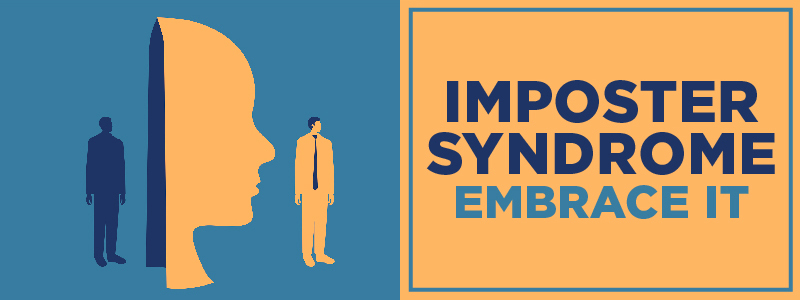 By: Mike Milios
By: Mike Milios
Why am I petrified every night before a hearing? Ahhh–it’s that imposter syndrome voice sneaking into my thoughts again. He tells me, “You didn’t prepare enough,” or “I can’t believe your client paid YOU,” or “You missed something obvious, and you’re going to be humiliated.” It can be brutal. While these feelings tend to motivate me, they’re emotionally draining and cause anxiety.
Dr. Charles Black defines Imposter Syndrome as a pattern of thinking where individuals doubt their skills, talents, and successes and see themselves as inept and at risk of being exposed for the fraud they are. In my experience, law school and our legal community culture can fuel imposter syndrome. Has anyone else shown up to court worried that everyone knows what they’re doing and you’re missing something? It happens to me.
I hesitate to ask for help at times. My ego and pride keep me from asking questions that give the appearance that I don’t know what I am doing. I always want to take care of my clients, but there is a deep fear, whether in the courtroom or in simply calling a friend, that people will think I don’t know what I’m doing, especially with over 15 years of practice.
I want to share my experience with imposter syndrome because you may have fear and doubt that surface in your mind. I set out on a journey a few years ago to explore imposter syndrome. I found some good news. Imposter syndrome is normal and, when managed, can be an advantage. Imposter syndrome makes me a better lawyer when I change the narrative and the dialogue with the self-doubt voice in my head.
Here's what works for me, and I invite you to explore tools that will serve you.
1. Speak Up
Navigating imposter syndrome improved when I picked up the phone and asked a question instead of spinning endlessly online, ramping up my anxiety. I had a deep fear of asking for help without deep diving into the subject matter first. This cost me a lot of time and anxiety.
Here’s my script.
“Hi, I’m Mike. I’ve got issues, mostly related to my case. May I ask a few questions? If not, I’m going to google-search for the next six hours until I end up in the fetal position on the floor.” (Maybe this isn’t verbatim, but it’s that easy.)
Do you know what usually happens? The clerk, opposing counsel, friend, and/or grocery store clerk are compassionate and offer information. Sometimes the other person admits that she, too, had the same question but was hesitant to ask. Or maybe everyone is laughing behind my back, but unlikely.
I had an issue with the federal sentencing guidelines recently. I was embarrassed to ask questions because I’m supposed to be an “expert” after years of federal practice. I called Probation, however, to let them know I was lost and needed some clarification. Guess what happened? The probation officer offered a zoom call for me and the assistant U.S. attorney (AUSA). The AUSA had the same questions, and he appreciated that I reached out.
I helped my client, established a connection with opposing counsel, and saved myself hours. Even as “experienced counsel,” or maybe even more so, it’s a wise practice to reach out to ask for help when we think we should know the answer.
2. Awareness
“Hello, Imposter Syndrome/Inner Critic, welcome. Would you like some decaf coffee if you’re lingering in my thoughts?” This is how to greet thoughts of doubt. Levity helps too. I used to try to push the doubt away whenever the inner critic chimed up. It doesn’t work when you tell your brain to stop thinking about something.
A few years ago, I started a practice where I openly greet and welcome the inner critic, anxiety, and fear. It’s not an easy practice.
A few years ago, I started a practice where I openly greet and welcome the inner critic, anxiety, and fear. It’s not an easy practice. I learned it from one of my favorite meditation teachers, Yongey Mingyur Rinpoche. Intentionally noticing and labeling my doubts, fears, and concerns with a sense of nonjudgment and compassion work well for me instead of resistance.
The magic happens when I acknowledge the anxiety and imposter syndrome. I know I am not those thoughts. I have learned that these thoughts are normal and part of my human existence. Fear, doubt, and anxiety are perfectly natural, so why waste more energy letting them overwhelm me? In turn, I healthily process the negative thoughts by allowing myself time to notice them and acknowledge them. (Another great example is the “Guest House” by Rumi.)
I’ll admit that it’s not an easy practice at first, but, in time, it’s made me more confident in my skills and preparation.
3. Reframe
My anxiety and fears fuel my success. It felt counter-intuitive to reframe my doubts as something potentially positive. MIT professor Basima Tewfik studies imposter syndrome. His studies show that people with imposter syndrome perform as well as their colleagues and tend to put more effort into interpersonal aspects of their job.
Tewfik encourages people to reframe the idea that imposter syndrome is purely negative. It’s an opportunity, instead, for confident humility. People can acknowledge that their doubts are usual and use that awareness for improvement.
Imposter syndrome can be an opportunity to learn, especially when people approach it with a sense of curiosity. I notice when those doubts creep in that it’s time for me to bring awareness to them instead of resisting. I then filter through the thoughts to figure out what I need to work on instead of being overwhelmed by doubts and anxiety. It’s a daily practice.
If you struggle with doubts and uncertainty about your skills, talents, and preparation, I encourage you to explore how imposter syndrome may be showing in your life.
If you struggle with doubts and uncertainty about your skills, talents, and preparation, I encourage you to explore how imposter syndrome may be showing in your life. Does it help to talk about it, bring awareness to your thoughts, and reframe your thinking? It’s not a one-size-fits all approach. And it might be something where a mental health professional would be beneficial. (Lawyers Concerned for Lawyers provides four free counseling sessions.)
Once you figure out what works for you, let’s change our legal culture. Leaders and experienced counsel, please set the example in the courtroom and the office. Be authentic, compassionate, and humble. Our profession is improved when we create a space for authenticity, respect, and humility. Leaders, be brave–admit when you are nervous or afraid, have doubts, or don’t know something. You’ll be serving yourself and our community.
 Michael Millios
Michael Millios
Mike@millioslaw.com
In 2013, Mike discovered that yoga and mindfulness tools significantly helped his mental and physical health after years of unhealthy trauma management due to compassion fatigue and post-traumatic stress stemming from Army service and work as a criminal defense lawyer. In 2017, Mike began training in mindful resilience, meditation, and yoga to help his community. Mike has been guiding wellness and mindfulness workshops for caregivers and client focused professionals since 2018. Mike launched Millios Mediation and Wellness in 2021 to offer individual coaching services. Mike founded Karuna Community Mn, a Minnesota non-profit, to share mindfulness tools with people who are incarcerated or in treatment. Mike currently serves as a Veterans lawyer and criminal defense lawyer at Millios Law.